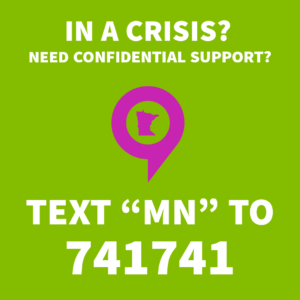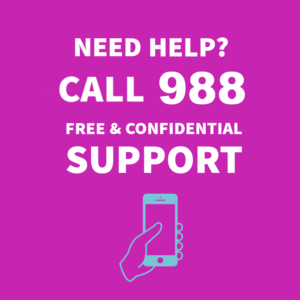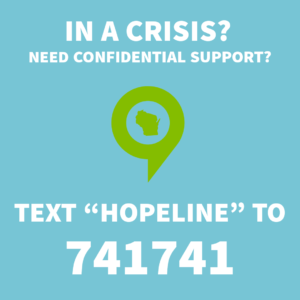Suicide Prevention, Awareness and Support
The following content includes potentially triggering information about suicide and self-harm.
Suicide is the second leading cause of death for young people between the ages of 10 to 24. Sometimes the struggle can be underestimated because of age. We hear you and help is available.
Suicidal thoughts are not rare and you are not alone. They show up under predictable conditions. Generally, if a person is feeling down for long enough, they will begin to have thoughts such as “maybe I shouldn’t be here anymore,” “it would be better for my friends, relatives and other loved ones if I wasn’t here,” etc. If these thoughts are not addressed and things continue to be difficult or get worse, these thoughts can turn into planning ways that someone could end their life. This is called “making a plan.” If things continue to be difficult or worsen, some people will act on these plans. This is not a mysterious or unusual situation. Scientists, medical doctors and psychologists have known about this process for decades. A person isn’t “weak” or “bad” if they have such thoughts. It’s a response to tremendous emotional pain that can be treated and things can get better.



All people are worthy of life, love, compassion and respect. Nothing anyone has ever done makes them unworthy of this.
Ask for help:
- Let your friends, family or teachers know what you need when they ask. They are there to help.
- Call the National Suicide Prevention Lifeline (988) or local crisis line any time. Calls are confidential.
- Text “MN” (MN) or “HOPELINE” (WI) to 741741.
- If you are concerned about your own well-being or a friend’s safety, call 911 if you think there is an emergency and ask for a crisis intervention team.
Remember that these feelings can be overcome. Relationship conflict, family issues, grades, identity and losing things or people closest to you can feel impossible to deal with. However, with support, you can work through them.
Make a safety plan to help guide you through difficult moments and keep you safe.
- Recognize your own warning signs. What thoughts, images, moods, situations and behaviors show you that a crisis may be developing? Write it down in your own words.
- Use your own coping strategies. List things that you can do on your own to help you resist urges to harm yourself or others. Review the “Creating a Grief Support System” to help you write these down.
- Connect with others who may offer support and distract from the crisis. List people, places and things that can help take your mind off of difficult thoughts or feelings.
- Reach out to family members, friends, or other people in your life who you feel comfortable talking to and who are supportive.
- Find additional support. Make a list of names, numbers and/or locations of professionals, local emergency rooms and crisis hotlines and use the numbers when needed.
- Make sure you are in a safe environment. Work with a professional to create a plan to limit your access to means of self-harm or hurting others.
Evaluate the relationships in your life. Do they contribute to your happiness? Do they feel safe, loving, respectful and supportive? Unhealthy or toxic relationships can negatively affect you. You have the right to be respected, feel safe, say no, leave a relationship at any time, and to have privacy.
Make a self-care plan to help guide you through difficult moments and keep you safe.
Self-care is any activity that you do to take care of your mental, emotional and physical health. When you know what you need to do to take care of yourself, you are also better able to take care of others. It is not selfish to take care of yourself. Self-care is key to living a balanced life. Here are some suggestions to guide you:
- Brainstorm actions you can take to maintain healthy connections with other people.
- Think about what you do to express emotions in a healthy way.
- Focus on values that support your sense of purpose.
- Consider how you maintain a healthy balance between work and play.
- Find and prioritize activities that “renew” your mental and emotional health. Think about how you currently prioritize work or school tasks and activities. Do you need to refocus or prioritize another way?.
- Focus on healthy habits that improve your well-being. Avoid unhealthy habits that can affect your physical and mental health.
Take a long look at how you treat yourself. When you practice self-care, your physical and mental health benefit. Identify what causes you stress, how you react to stress, and try to eliminate or decrease stress. Focus on your goals and the future when you feel out of control. Rely on a positive support system including your friends, teachers and family.
Take concerning comments, thoughts and “jokes” seriously. Some people feel that these comments are attention-seeking but if someone confides in you about self-harm or hurting, believe them and get help from a trusted adult. No individual should feel pressure to be able to “fix” the pain on their own and they are not expected to. Professionals go through a tremendous amount of training to support these situations. Reach out and ask for help.
Learn the warning signs.
- Talking about wanting to die or self-harm
- Looking for a way to die by suicide, like searching online, asking, or purchasing weapons
- Talking about feeling hopeless or not wanting to live
- Talking about feeling trapped or in unbearable pain
- Talking about being a burden to others
- Increasing alcohol or drug use
- Behaving recklessly; acting anxious or agitated
- Sleeping too little or too much
- Withdrawing or isolating themselves
- Showing rage or talking about seeking revenge
- Extreme mood swings
Listen with empathy, compassion, and provide support. A fight with friends, a break up or performing poorly in school might not feel like a big deal but the pain can feel immense. Empathize and listen. Minimizing what others are going through can increase their feelings of hopelessness. Seek additional support immediately if anyone confides in you about harming themselves or others.
Call the National Suicide Prevention Lifeline (988) or local crisis line any time. Text “MN" (MN) or “HOPELINE" (WI) to 741741.
It's important to remind ourselves that suicidal thoughts are lies. Sometimes our minds have unhelpful thoughts that would be unwise to act on. Suicidal thoughts are an extreme version of this. In interviews with individuals who attempt suicide, professionals have learned that people who attempt suicide go through the mental process explained above. Rarely, if ever, is it the case that someone just decides to hurt or end their life with no forethought.
People can also experience tremendous pain inside and not show it. Emotions change regularly. They go up and down. Even when something horrible happens or when we have been down for a long time and have these thoughts, it does not in any way mean we will always feel like this. Check in with your loved ones regularly. If you have concerns about a loved ones’ mental health, talk with them and provide support. Help is always available.
Death by suicide or consequences of a non-fatal suicide attempt are permanent. If we self-harm or die by suicide, we never have the chance to recover. If you are having suicidal thoughts or thoughts of self-harm or hurting others in any way, talk to someone who cares about you right away. This could be a friend, family member, neighbor, doctor, educator, therapist, police officer, or anyone you trust. You can also call a crisis line (988) or text “MN” (MN) or “HOPELINE” (WI) to 741741 to speak with a trained professional confidentially without judgment or criticism. You can find a list of local crisis lines and numbers here.

 Pinterest
Pinterest  Instagram
Instagram 

